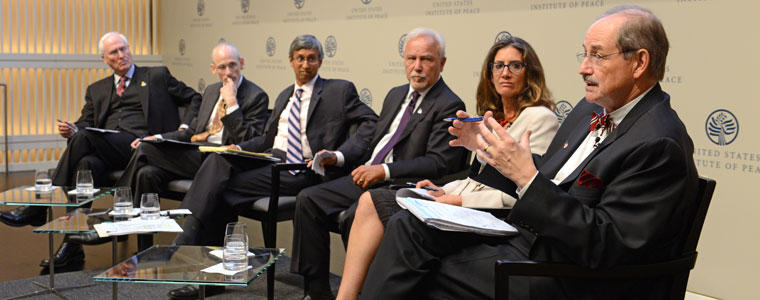Assuring access to water of adequate quantity and quality in the face of increasing challenges poses a growing risk of future conflicts. But in preventing any outbreak of conflict, better water management can play a vital role in building peace and cooperation, a variety of officials and specialists said at the Water Security and Conflict Prevention Summit held at the U.S. Institute of Peace (USIP) on September 10.

The summit also launched an initiative called the “Water Security and Conflict Prevention Trust” that brings together scientific, military, business, civil society, diplomatic and national security leaders for a year-long examination of issues and possible solutions to conflicts surrounding Nigeria and the Niger River basin and Pakistan and the Indus River basin. Working groups on both areas began their work this week at USIP.
The summit was sponsored by USIP, the Association of the United States Army and the U.S. Water Partnership, a U.S.-based public-private partnership that includes 61 U.S. government agencies and business, academic and civil society organizations. Organizers said the meetings this week and the ongoing Trust initiative are intended to highlight water security issues and explore conflict-sensitive and preventative responses that reflect the economic and strategic needs of all parties involved.
“Judicious water management can lead to peacebuilding,” Lieutenant General Thomas Bostick, commander of the U.S. Army Corps of Engineers, told the summit event. Bostick said the right questions include how investments in water management and security can promote stability in regions that lack it.
The meeting reflected rising global interest in the issue. “You’re really seeing water and security growing on the international political agenda,” said Aaron Salzberg, the U.S. State Department’s special coordinator for water resources. “Our goal is to keep these disagreements from escalating into violent conflict,” he said, and instead deal with them in ways that “foster trust and cooperation.” He added, “We shouldn’t lose the value of water as a peacebuilding tool.”
At the same time, Salzberg warned against exaggerating water-related disputes as a trigger of violent conflict. “Don’t get caught up in the water wars rhetoric,” he said. “Water wars are extremely rare.”
Jerome Delli Priscoli, governor of the World Water Council and senior advisor to the Corps’s Institute for Water Resources, also cautioned that risks of conflict tend to stem not from overall scarcity but from populations changing their previous patterns of water use and demand. “It’s in the transitions in the distribution of water that we see the violence,” he said. Good governance practices are related to good water management and water security, he said. Priscoli also urged observers not to “fall into a Malthusian trap in looking at water” by seeing rising global population as necessarily leading to conflicts over water.
Major General Richard Engel of the National Intelligence Council (NIC) reviewed the findings of a 2012 intelligence community report on global water security. He said that in the next decade water problems will contribute to instability and regional tensions but are not likely to spur outright state-to-state conflict. Over a longer time horizon, the dangers grow. “Beyond 10 years, we saw water-related conflict as plausible,” he said. The NIC report also said that between now and 2040 fresh water availability will not keep pace with demand unless water management is improved, harming the economic performance of some U.S. trading partners. Depletion of groundwater in some agricultural areas will also bring risks to national and global food markets. Engel said that officials have developed “increased sensitivity [on water security issues], and now it’s institutionalized within the intelligence community.”
Christian Holmes, global water coordinator for the U.S. Agency for International Development, noted that his agency this year launched its first water and development strategy, a document that calls for water policies aimed foremost at improving health and food security in the developing world. He suggested the need for more research on linkages between water issues and conflict, saying, “There isn’t a lot out there compared to other disciplines.”
Private-sector representatives also called for cooperative approaches to water security issues. “The business community has a vital role to play as well,” said Jeff Seabright, vice president of environment and water resources for the Coca-Cola Company. Coca-Cola, the largest private employer in Africa, operates nearly 1,000 bottling plants worldwide, he said. In partnership with USAID, it conducts a “Replenish Africa” initiative intended to increase the number of Africans with access to fresh water by 2015. But Seabright said that other parts of the private sector are also taking a greater interest in water issues. “More and more companies are recognizing [that water involves] critical issues in the countries in which they operate.”
He also sounded a note of optimism on the value of cooperative action. “We can solve these issues,” Seabright said. “We just have to get focused and organized and generate collective will.”
Explore further
- A news feature on Pakistan's water security problems from USIP's "2013 Sleeper Risks" series
- A May 2013 USIP Peaceworks report by researchers Daanish Mustafa, Majed Akhter and Natalie Nasralla on water security-related aspects of domestic discord in Pakistan
- A February 2013 USIP Special Report by Frederick S. Tipson on "Natural Disasters as Threats to Peace"
- A 2012 USIP Peace Brief by Amanda Mayoral on "Climate Change as a Conflict Multiplier"
- A 2010 USIP Peace Brief by Joel Whitaker and Anand Varghese on "The Tigris-Euphrates River Basin: A Science Diplomacy Opportunity"
- Association of the United States Army
- U.S. Water Partnership